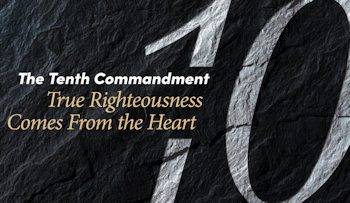The Ten Commandments are ten principles given by God to Moses on Mt. Sinai after the enslaved Israelites were delivered out of Egypt. These ten major rules were written upon two tablets of stone and called the Decalogue,1 but best known as the Ten Commandments. These commandments are listed in the Bible in two forms, which exhibit some variations. They can be found at Exodus 20:2–17 and Deuteronomy 5:6–18.2
Although some people believe that the Ten Commandments were abolished with Christ’s sacrifice, it is not true. The full Decalogue may not be listed in the New Testament, but is alluded to in five places (Matt. 5:17-19; Mark 10:19; Luke 18:20; Rom. 7:7-8; 13:9; 1 Tim. 1:9-10),3 and Jesus even stated that it was not his job to do away with the law.
Do not think that I have come to abolish the law or the prophets; I have come not to abolish but to fulfill. For truly I tell you, until heaven and earth pass away, not one letter, not one stroke of a letter, will pass from the law until all is accomplished. Therefore, whoever breaks one of the least of these commandments, and teaches others to do the same, will be called least in the kingdom of heaven; but whoever does them and teaches them will be called great in the kingdom of heaven. For I tell you, unless your righteousness exceeds that of the scribes and Pharisees, you will never enter the kingdom of heaven” (Matthew 5:17–20. NRSV).4
Many Bible teachers and most all scholars say there are more commandments than just ten, and this is true. The Hebrew Torah contains 613 detailed commandments from God,5 but generally, everyone means just the major ones given to Moses on stone tablets at Mt. Sinai, when speaking about God’s commandments.
The Last One
 This study is about the tenth commandment—the last one. It is about “coveting” and a modern dictionary definition states covet as: (1) to wish for, (2) to inordinately desire what belongs to another.6 The biblical definition is pretty much the same, which is “desiring to possess something at the expense of the legitimate owner.”7 This word covet8 is translated as lust or strong desire in many Bible versions.
This study is about the tenth commandment—the last one. It is about “coveting” and a modern dictionary definition states covet as: (1) to wish for, (2) to inordinately desire what belongs to another.6 The biblical definition is pretty much the same, which is “desiring to possess something at the expense of the legitimate owner.”7 This word covet8 is translated as lust or strong desire in many Bible versions.
“You shall not covet your neighbor’s house; you shall not covet your neighbor’s wife, or male or female slave, or ox, or donkey, or anything that belongs to your neighbor” (Exodus 20:17).
Catholicism deletes one of the commandments (“Thou shalt not make unto thee any graven image…”) and divides the last commandment into two separate ones: 9th, “Thou shalt not covet thy neighbor’s wife” and 10th, “Thou shalt not covet thy neighbor’s goods.”
A common belief is that the Catholic Church changed the listing of the Ten Commandments by removing the commandment about “not worshiping idols” and divided the 10th commandment into two, so there would still be a total of ten. The Catholic Church, however, gives a different reason for the change. They justify the change by claiming the original texts did not have verse numbers and did not specify how they should be grouped. According to one Catholic writer, it was St. Augustine’s reasoning to divide the Decalogue this way and the church just continues to observe it.9 It should be noted here that the Lutheran Churches (but not the Reformed) and some few others, follow this same tradition.
This commandment is different.
“Unlike the other commandments which focus on outward actions, this commandment focuses on thought.” It is imperative not to set one’s desire on things that are forbidden. “One commandment forbids the act of adultery. This commandment forbids the desire for adultery. One commandment forbids stealing. This commandment forbids the desire for acquisition of another’s goods.”10 As an example, Jesus emphasized this fact when he said, “You have heard that it was said, ‘You shall not commit adultery.’ But I say to you that everyone who looks at a woman with lust has already committed adultery with her in his heart” (Matthew 5:27-28).
A German theology professor and monk, Martin Luther, said by nature no one desires to see another have as much as himself. Be careful not to openly pretend to be Godly, while concealing our rascality, by inventing ways to make our neighbor jealous or angry. A man doing things only to make his neighbor’s beautiful wife desire himself over her husband, even if not breaking some law, is still “coveting” by being unwilling to allow his neighbor to enjoy what God has granted only to him.11 Regulating our thoughts, according to French theologian John Calvin, is necessary to keep them from becoming depraved and distorted.12
Welsh minister and author Matthew Henry said that the commandment “Thou shall not covet” implicitly forbids any desire of doing that which will bring injury to our neighbor and “this forbids all inordinate desire of having that which will be a gratification to ourselves.”13
 This commandment is different “in that it did not deal with a specific act, but rather with an emotional, psychological sin. Therefore, the breaking of this commandment could not be prosecuted in a law court.” Yet it often led to acts that could be prosecuted. “It may have been possible for someone to keep the first nine commandments but no one could have avoided breaking the 10th at some time. In this respect the 10th commandment is the most forceful of all, because it made people aware of their inability to keep God’s Law perfectly. And this awareness threw them back to depend on God’s grace and mercy.”14
This commandment is different “in that it did not deal with a specific act, but rather with an emotional, psychological sin. Therefore, the breaking of this commandment could not be prosecuted in a law court.” Yet it often led to acts that could be prosecuted. “It may have been possible for someone to keep the first nine commandments but no one could have avoided breaking the 10th at some time. In this respect the 10th commandment is the most forceful of all, because it made people aware of their inability to keep God’s Law perfectly. And this awareness threw them back to depend on God’s grace and mercy.”14
The tenth commandment (or the 9th and 10th for Catholics) forbids the desire of what another has “as the root of theft, robbery, and fraud, which the seventh commandment forbids.” It is a “lust of the eyes” and “summarizes all precepts of the Law.”15 A modern interpretation for today’s world comes from author Kelli Mahoney.
“The tenth commandment asks us to look inside ourselves . . . [‘Want’] in itself is not wrong. We want food. We want to please God. We want love. Those things are good things to want. What is key to fulfilling this commandment is wanting the right things in the right way. Our possessions are temporal, they will only please us today, not for eternity. God reminds us that our wants should reflect our eternal life with Him.
“Also, we must beware of our needs and wants becoming obsessions. When our entire focus is our wants, we can sometimes become ruthless in trying to get those things. We forget about people we care about, we forget about God . . . our desires become all-encompassing. When we spend our time comparing ourselves too much to others, we lose a sense of whom we are as individuals. [And] God created each of us as individuals.”16
Covet for Goodness?
Although rarely used, in the New Testament covet17 can be applied as a commendable earnest desiring, such as a desire for the greater spiritual gifts (1 Corinthians 12:31; 14:1, 39).18 In these cases, one may greatly desire a beneficial attribute like that of another, but without actually wanting to take it away from, or doing any harm to, the other person.
The Apostle Paul, when speaking to the Corinthian church, said there are some things that should be coveted and they are the gifts from God. “The gifts are gifts—they aren’t prizes for goodness or effort . . . [and] they may be given to individuals, but they are for the whole church. Even the most sensational gift is only valuable when it builds the church in the understanding, service, and mission of Christ.”19
Conclusion
 “You shall not covet” means that we should overcome our desires for whatever does not belong to us, so obedience to the tenth commandment requires that envy be banished from the human heart. “Covetous desires create disorder because they move beyond satisfying basic human needs and exceed the limits of reason and drive us to covet unjustly what is not ours and belongs to another.”20
“You shall not covet” means that we should overcome our desires for whatever does not belong to us, so obedience to the tenth commandment requires that envy be banished from the human heart. “Covetous desires create disorder because they move beyond satisfying basic human needs and exceed the limits of reason and drive us to covet unjustly what is not ours and belongs to another.”20
“For from within, out of the heart of man, come evil thoughts, sexual immorality, theft, murder, adultery, coveting, wickedness, deceit, sensuality, envy, slander, pride, foolishness. All these evil things come from within, and they defile a person.” (Mark 7:21–23, ESV).
![]()
Copyright ©2019 Dr. Ray Hermann
OutlawBibleStudent.org
→ Leave comments at the end, after References & Notes.
OBS respects your privacy and is compliant with accepted U.S. practices as well as European Union GDPR regulations.
References & Notes
- Decalogue: Greek: deca + logos (ten words).
- Singer, Isidore, (ed.), The Jewish Encyclopedia: A Descriptive Record of the History, Religion, Literature, and Customs of the Jewish People from the Earliest Times to the Present Day, 12 Volumes, (New York; London: Funk & Wagnalls, 1901–1906), p. 492.
- Easton, M. G., Easton’s Bible Dictionary, (New York: Harper & Brothers, 1893).
- Unless otherwise noted, scripture quotations are from the New Revised Standard Version Bible (NRSV), ©1989 the Division of Christian Education of the National Council of the Churches of Christ in the United States of America. Used by permission. All rights reserved.
- “613 commandments,” (Wikipedia, Wikimedia Foundation, Inc., 12 March 2019), https://en.wikipedia.org/wiki/613_commandments
- Merriam-Webster’s Collegiate Dictionary, (Springfield, MA: Merriam-Webster, Inc., 2003).
- Manser, Martin H., Dictionary of Bible Themes: The Accessible and Comprehensive Tool for Topical Studies, (London: Martin Manser, 2009), listing #6133.
- Strong’s Hebrew #2530. חָמַד châmad; a prim. root; to delight in: greatly beloved, covet, delectable thing, (× great) delight, desire, goodly, lust, (be) pleasant (thing), precious (thing).
Strong, James, The New Strong’s Dictionary of Hebrew and Greek Words, (Nashville: Thomas Nelson, 1996). - Richardson, Joseph T., “St. Augustine on How to Divide the Ten Commandments: Did Catholics ‘Change’ the Ten Commandments?” (The Lonely Pilgrim, 9 October 2013), http://lonelypilgrim.com/2013/10/09/st-augustine-on-how-to-divide-the-ten-commandments-did-catholics-change-the-ten-commandments/
- Thou shalt not covet,” (Wikipedia, Wikimedia Foundation, Inc., 14 February 2019), https://en.wikipedia.org/wiki/Thou_shalt_not_covet
- Luther, Martin, The Large Catechism, (translated by F. Bente and W. H. T. Dau, Triglot Concordia: The Symbolical Books of the Evangelical Lutheran Church), (St. Louis: Concordia Publishing House, 1921), pp. 565-773.
- Calvin, John, Institutes of the Christian Religion, Bk. 2, Ch.8, Section 49. (also available online at Internet Archive Way Back Machine, 20 October 2014 [http://www.spurgeon.org/~phil/calvin/bk2ch08.html]), at: https://web.archive.org/
- Henry, Matthew, Matthew Henry’s Commentary on the Whole Bible, (Peabody, MA: Hendrickson Publishers, 1991), vol. 1, p. 286.
- Deere, Jack S., “Deuteronomy,” in The Bible Knowledge Commentary: An Exposition of the Scriptures, (ed.) J. F. Walvoord and R. B. Zuck, (Wheaton, IL: Victor Books, 1985), vol. 1, p. 273.
- “You Shall Love Your Neighbor as Yourself,” (Catechism of the Catholic Church, retrieved 22 March 2019), Sec. 2, Art. 10, #2534, https://www.vatican.va/archive/ccc_css/archive/catechism/p3s2c2a0.htm
- Mahoney, Kelli, (ThoughtCo., Dotdash Publishing, 25 February 2019), https://www.thoughtco.com/10-commandments-don’t-covet-what-you-don’t-have-712186
- Strong’s Greek #2206. ζηλόω zēlŏō, or ζηλεύω zēlĕuō; from 2205; covet (earnestly), (have) desire, (move with) envy, be jealous over, (be) zealous (-ly affect).
Strong, James, The New Strong’s Dictionary of Hebrew and Greek Words, (Nashville: Thomas Nelson, 1996). - Manser, Martin H., “Coveting as a commendable earnest desiring,” Dictionary of Bible Themes: The Accessible and Comprehensive Tool for Topical Studies, (London: Martin Manser, 2009).
- Knowles, Andrew, (ed.), The Bible Guide, [1st Augsburg Books], (Minneapolis, MN: Augsburg Fortress, 2001), p. 586.
- “Thou shalt not covet,” (Wikipedia, Wikimedia Foundation, Inc., 14 February 2019), https://en.wikipedia.org/wiki/Thou_shalt_not_covet


1 thought on “What does ‘Covet’ Mean?”